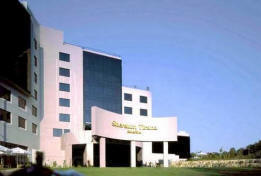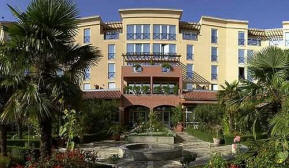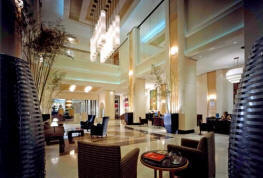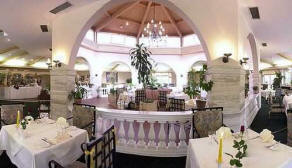|
Albania is a
Mediterranean country in southeastern Europe. It is bordered by
Serbia and Montenegro in the north, the Republic of Macedonia in
the east, and Greece in the south; it has a coast on the
Adriatic Sea in the west, and a coast on the Ionian Sea in the
southwest. The country is an emerging democracy and is formally
named the Republic of Albania (Albanian: Republika e Shqipërisë |
|
|
SHERATON TIRANA HOTEL
PO BOX 1717 SHESHI ITALIA
Tirana, Albania |
|
ROGNER HOTEL EUROPAPARK
DESHMORET E KOMBIT - Tirana, Albania |
|
|
 |
|
 |
|
 |
 |
|
Full Service - Hotel Year
Built - 2003 Year Remodeled - 2003 Additional
Property Description - In The Heart Of Tirana
Near Embassies And Business Sites Is Our Brand
New Hotel Combining Comfort..Style And
Impeccable Service. The Hotel Is Located Within
A Shopping And Entertainment Complex. Hotel
Offers 56 Suites Of Different Catergories And
Two Tower Floors. |
This Newly Built Hotel Has Been Open Since
August 1995.It Is The Unique 4 Star International Standard
Hotel In Albania.the Hotel Is Located In Tiranas City Centre
On The Main Boulevard Next To Congress Centre And
Ministries.there Is An Extended Swimming Pool In The Centre
Of An Oriental Style Garden.the Hotel Features 117 Double
Rooms Rooms For Disabled Guests 20 Suites And Suites With
Kitchenette.all Rooms And Suites Have Shower Hairdryer
Telephone Mini Bar Satellite Non Smoking Rooms Are
Available. Austrian Management. |
|
Albania
Tirana
History
Main articles: Illyria, Illyricum, Dalmatia,
History of Albania.
In the area that is today Albania, human
activity has been present since the beginning of
human history. The earlier inhabitants were
probably part of the pre-Indo-European populace
that occupied the coastline of most parts of the
Mediterranean. Their physical remains are scarce
though, and concentrated on the coastal region.
Soon, these first inhabitants were overrun by
the Proto-Hellenic tribes that gradually
occupied modern-day Greece, southern parts of
what is now the Republic of Macedonia and the
south of present-day Albania. This process was
completed over the second millennium BC and did
not really affect northern or central Albania,
an area that at the time presented the image of
a political vacuum (in essence a historical
paradox). Historians do not agree over the
origin of the Illyrians. Some of them maintain
that the Illyrians descended from the
pre-Indo-European Pelasgians, while most
scholars place them in the later wave of
Indo-European invasions. Their presence can be
traced back to 900 BC, when their political
structure was formulated in the 7th and 6th
centuries BC. Excellent metal craftsmen and
fierce warriors, the Illyrians formed warlord
based kingdoms that fought amongst themselves
for most of their history. Only during the 6th
century did the Illyrians venture significant
raids against their immediate neighbours: the
kingdom of the Molossians in northern Epirus
(present southern Albania), the kingdom of
Macedon, and the kingdom of Paionia. Probably
their most important success was the slaughter
of Perdiccas III, king of Macedon. Unfortunately
for the Illyrians, Perdiccas was succeeded by
Philip II, father of Alexander the Great, who
effectively terminated the Illyrian aggression.
Besides warfare, the Illyrians were also
peaceful traders of agricultural products and
metal works. The Illyrian culture was influenced
by the Greek culture (mainly the south Illyrian
tribes). Albania is also the site of several
ancient Greek colonies.
After being conquered by the Roman Empire,
Illyria was reorganized as a Roman province,
Illyricum, later divided into the provinces of
Dalmatia and Pannonia, the lands comprising
Albania mostly being included in Dalmatia.
Later, the Byzantine Empire governed the region.
After centuries, use of the name Illyria to
denote the region fell out of fashion. In the
middle ages, the name Albania (see Origin and
history of the name Albania) began to be
increasingly applied to the region now
comprising the nation of Albania. The territory
of Albania became part of the Ottoman Empire in
1478, after years of resistance under the
leadership of Gjergj Kastrioti Skenderbeu, the
Albanian National Hero.
After the First Balkan War, Albania declared its
independence from the Ottoman Empire in 1912,
becoming a principality. From 1928 on, the
country was ruled by King Zog I until 1938 when
it became a puppet of Italy.
The communists took over after World War II, in
November 1944, under the leader of the
resistance, Enver Hoxha. From 1945 until 1990
Albania had one of the most repressive
governments in Europe. The communist party was
created in 1941 with the direction of Bolshevik
Communist Parties. All those who opposed it were
eliminated. Enver Hoxha became the leader of
this party. For many decades of his domination,
Hoxha created and destroyed relationships with
Belgrade, Moscow, and China, always in his
personal interests. The country was isolated,
first from the West (Western Europe, North
America and Australasia) and later even from the
communist East.
In 1985, Enver Hoxha died and Ramiz Alia took
his place. Initially, Alia tried to follow in
Hoxha's footsteps, but in Eastern Europe the
changes had already started: Mikhail Gorbachev
had appeared in the Soviet Union with new
policies (Glasnost and perestroika). The
totalitarian regime was pressured by the US and
Europe and the hate of its own people. After
Nicolae Ceauşescu (the communist leader of
Romania) was executed in a revolution, Alia knew
he would be next if changes were not made. He
signed the Helsinki Agreement (which was signed
by other countries in 1975) that respected some
human rights. He also allowed pluralism, and
even though his party won the election of 1991
it was clear that the change would not be
stopped. In 1992 the general elections were won
by the Democratic Party with 62% of the votes.
In the general elections of June 1996 the
Democratic Party tried to win an absolute
majority and manipulated the results. In 1997
the fraud of the pyramid schemes shocked the
entire government and riots started. Many cities
were controlled by militia and armed citizens.
This anarchy and rebellion caused the socialist
party to win the early elections of 1997.
Since 1990 Albania has been oriented towards the
West, was accepted in the Council of Europe and
has requested membership in NATO. The working
force of Albania has continued to emigrate to
Greece, Italy, Europe and North America.
Corruption in the government is becoming more
and more obvious. The politics have not
fulfilled the people's hope for a short and not
too painful transition.
|
|
|
|
|
Location:
|
Southeastern Europe, bordering the Adriatic Sea and
Ionian Sea, between Greece and Serbia and Montenegro
|
|
Background:
|
Between 1990 and 1992 Albania ended 46 years of
xenophobic Communist rule and established a
multiparty democracy. The transition has proven
difficult as corrupt governments have tried to deal
with high unemployment, a dilapidated
infrastructure, widespread gangsterism, and
disruptive political opponents. International
observers judged legislative elections in 2001 to be
acceptable and a step toward democratic development,
but identified serious deficiencies that should be
addressed through reforms in the Albanian electoral
code. |
|
Languages:
|
Albanian (Tosk is the official dialect), Greek
|
|
Exchange rates:
|
leke per US dollar - NA (2002), 143.49 (2001),
143.71 (2000), 137.69 (1999), 150.63 (1998)
|
|
|
|
|
|

